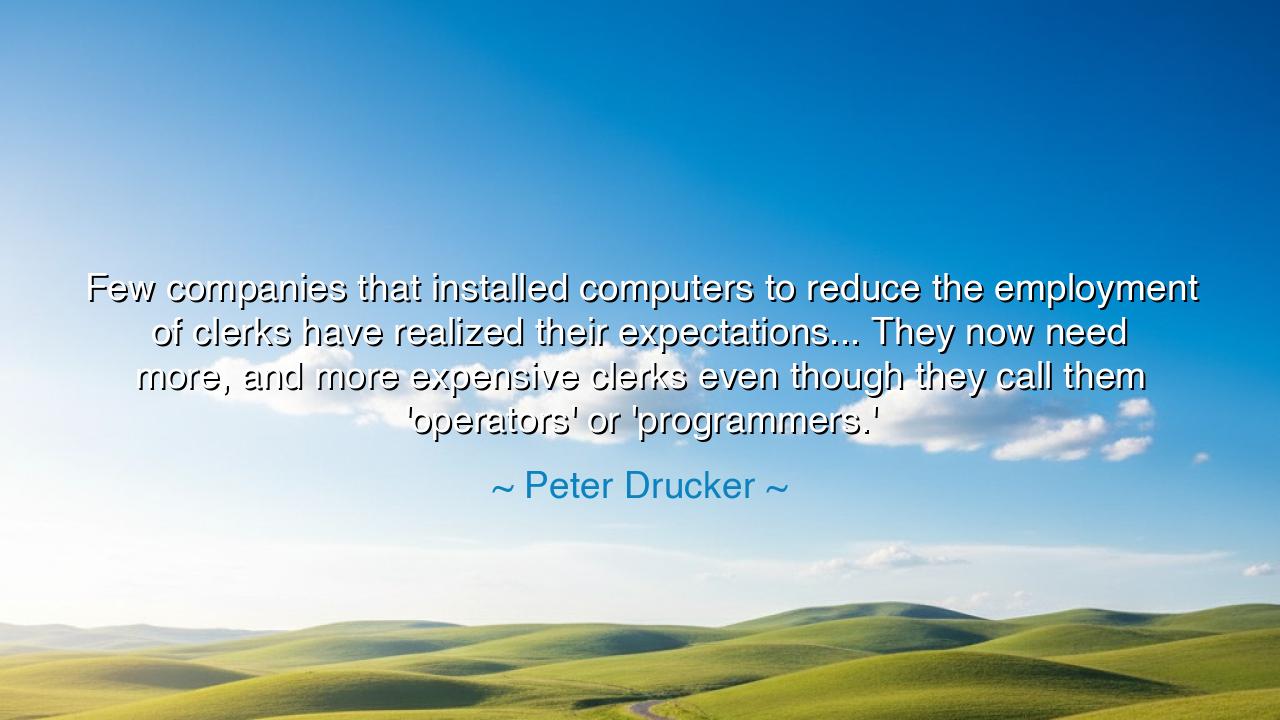
Few companies that installed computers to reduce the employment
Few companies that installed computers to reduce the employment of clerks have realized their expectations... They now need more, and more expensive clerks even though they call them 'operators' or 'programmers.'






"Few companies that installed computers to reduce the employment of clerks have realized their expectations... They now need more, and more expensive clerks even though they call them 'operators' or 'programmers.'" – Peter Drucker
In the annals of human endeavor, there have been many moments when innovation promised to revolutionize the world. Yet, there is often a hidden irony in the pursuit of progress. Peter Drucker, a sage of the modern business world, draws attention to this paradox in his observation about the role of technology in the workplace. He speaks of the widespread belief that the introduction of computers would reduce labor, making operations more efficient by eliminating the need for the multitude of clerks who once toiled in offices. Yet, this expectation has not been realized. Instead, companies now find themselves in need of more workers—operators and programmers—who are often more expensive and require greater expertise than the simple clerks they replaced.
Consider, if you will, the ancient world, where the invention of the wheel was seen as a miraculous advancement, promising to ease labor and enhance transportation. Yet, with the advent of the wheel came a new set of challenges—the need for skilled artisans to craft wheels, the demand for better roads to carry carts, and the necessity of additional labor to handle the increased trade and commerce. In this way, innovation, while powerful, often brings about its own complexities—as the wheel opened the door to new possibilities, so too did it create the need for new forms of labor, new challenges, and new demands on human resources. The same can be said of the computer revolution in modern times.
In the medieval era, the invention of the printing press by Johannes Gutenberg was hailed as a momentous breakthrough, bringing the written word to the masses. Yet, what followed was not just the spread of knowledge, but an entire new industry of printers, publishers, and distributors—roles that had not existed before. As with the press, the computer has created an entire new workforce—those who are tasked not with simple labor, but with the complex work of managing, operating, and programming the machines that were supposed to replace simpler jobs. Drucker’s words are a reminder that progress, while freeing us from some tasks, often leads to the emergence of new, sometimes even more intricate tasks.
This cycle of advancement and complication is as old as civilization itself. The rise of the industrial revolution, for example, promised to liberate workers from the back-breaking labor of the fields, yet it also created vast factories filled with workers who were, in many cases, required to perform tasks that were just as demanding as those they replaced. The machine, in that era, did not eliminate the need for labor—it simply changed the nature of that labor, making it more specialized and, in many ways, more intricate. In this way, the computer is not so different: while it was intended to simplify work and increase efficiency, it has instead given rise to a new class of workers—those who are more skilled, more expensive, and often more dependent on the very systems that were meant to replace them.
Thus, Drucker’s observation is both a reflection on the complexity of progress and a cautionary tale about the unintended consequences of technological advancement. The expectation that technology will eliminate the need for human labor is a fallacy. Technology does not replace humanity; rather, it reshapes the roles we play. Just as ancient tools like the plow or the loom gave birth to new forms of work, so too has the computer transformed the workplace, creating new demands and new specializations that were not previously imagined. In many cases, computers require human expertise to operate and maintain them, thus creating a cycle of labor and technological interdependence.
The lesson to be learned from this is profound: innovation does not always lead to the elimination of work, but rather to a redefinition of it. As we seek to advance, we must recognize that technology is not a magic bullet that will rid us of labor; rather, it is a tool that will shape the future of work, creating new roles and new challenges. The key to navigating this future lies not in fearing the rise of machines, but in adapting to them, in understanding that progress is not just about reducing work, but about transforming it.
So, in our own lives, as we witness the rise of new technologies, we must approach them with understanding and foresight. Let us not cling to the illusion that technology will relieve us of all labor, but instead embrace the reality that it will reshape the work we do. And in doing so, we must prepare ourselves to be part of the next wave of skilled workers, ready to meet the challenges that innovation brings. The future of work will be defined not by machines replacing humans, but by humans working alongside machines, adapting and evolving to create a world where both can thrive.






AAdministratorAdministrator
Welcome, honored guests. Please leave a comment, we will respond soon